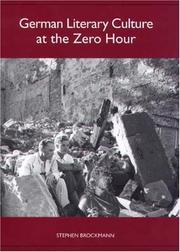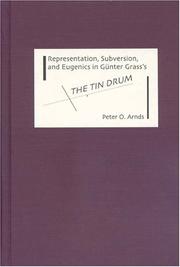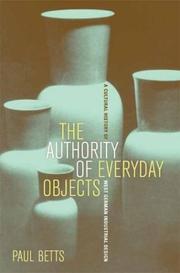| Listing 1 - 3 of 3 |
Sort by
|

ISBN: 1281949264 9786611949266 1571136525 1571132988 Year: 2004 Publisher: Rochester, N.Y. : Camden House,
Abstract | Keywords | Export | Availability | Bookmark
 Loading...
Loading...Choose an application
- Reference Manager
- EndNote
- RefWorks (Direct export to RefWorks)
In the immediate aftermath of the Second World War, German intellectuals and writers were forced to confront perhaps the most difficult complex of problems ever faced by modern intellectuals in the western world: the complete defeat and devastation of their country, the crimes of the Hitler dictatorship, the onset of the Cold War, and ultimately the political division of the nation. To a large extent these debates took place in literature and literary discourse, and they continue to have pressing relevance for Germany today, when the country is rediscovering and exploring this previously neglected period in literature and film. Yet the period has been neglected in scholarship, and is little understood; for the first time in English, this book offers a systematic overview of the hotly contested intellectual debates of this period: the problem of German guilt, the question of the return of literary and political émigrés such as Thomas Mann, the relevance of the cultural tradition of German humanism for the postwar period, the threat of nihilism, the politicization of literature, and the status of German young people who had been indoctrinated by the Nazis. Stephen Brockmann challenges the received wisdom that the immediate postwar period in Germany was intellectually barren, characterized primarily by silence on the major issues of the day; he reveals, in addition to attempts to obfuscate those issues, a German intellectual-and literary-world characterized by an often high level of dialogue and debate. Stephen Brockmann is professor of German at Carnegie Mellon University. He is the recipient of the 2007 DAAD (German Academic Exchange Service) Prize for Distinguished Scholarship in German and European Studies/Humanities.
German literature --- Literature and society --- Authors, German --- History and criticism. --- History --- Political and social views. --- Germany --- Intellectual life --- Cold War. --- Debate. --- Dialogue. --- Hitler Dictatorship. --- Intellectual Debates. --- Literary Discourse. --- Literature. --- Political Division. --- Postwar Germany. --- Second World War. --- Silence.

ISBN: 1571132872 9786611949211 1281949213 1571136495 Year: 2004 Publisher: Rochester, N.Y. : Camden House,
Abstract | Keywords | Export | Availability | Bookmark
 Loading...
Loading...Choose an application
- Reference Manager
- EndNote
- RefWorks (Direct export to RefWorks)
In receiving the Nobel Prize for Literature in 1999, Günter Grass, a prominent and controversial figure in the ongoing discussion of the German past and reunification, finally gained recognition as Germany's greatest living author, a writer of international importance and acclaim. Grass's 1959 novel 'The Tin Drum' remains one of the most important works of literature for the construction of postwar German identity. Peter Arnds offers a completely new reading of the novel, analyzing an aspect of Grass's literary treatment of German history that has never been examined in detail: the Nazi ideology of race and eugenics, which resulted in the persecution of so-called asocials as 'life unworthy of life,' their extermination in psychiatric institutions in the Third Reich, and their marginalization in the Adenauer period. Arnds shows that in order to represent the Nazi past and subvert bourgeois paradigms of rationalism, Grass revives several facets of popular culture that National Socialism either suppressed or manipulated for its ideology of racism. In structure and content Grass's novel connects the persecution of degenerate art to the persecution and extermination of these 'asocials,' for whom the persecuted dwarf-protagonist Oskar Matzerath becomes a central metaphor and voice. This comparative study reveals that Grass creates in the novel an irrational counterculture opposed to the rationalism of Nazi science and its obsession with racial hygiene, while simultaneously exposing the continuity of this destructive rationalism in postwar Germany and the absurdity of a 'Stunde Null,' that putative tabula rasa in 1945. Peter O. Arnds is associate professor of German and Italian at Kansas State University.
Eugenics in literature. --- Grass, Günter, --- Grass, Günter, --- German past. --- Günter Grass. --- Nazi ideology of race. --- Nazi ideology. --- Nazi science. --- Nobel Prize for Literature. --- Stunde Null. --- The Tin Drum. --- asocials. --- destruction rationalism. --- eugenics. --- postwar German identity. --- postwar Germany. --- representation. --- subversion. --- Grass, Gunter,

ISBN: 128236040X 9781417544996 9786612360404 0520941357 159734477X 9780520941359 1417544996 9781417544998 0520240049 9780520240049 9781282360402 9781597344777 Year: 2004 Publisher: Berkeley : University of California Press,
Abstract | Keywords | Export | Availability | Bookmark
 Loading...
Loading...Choose an application
- Reference Manager
- EndNote
- RefWorks (Direct export to RefWorks)
From the Werkbund to the Bauhaus to Braun, from furniture to automobiles to consumer appliances, twentieth-century industrial design is closely associated with Germany. In this pathbreaking study, Paul Betts brings to light the crucial role that design played in building a progressive West German industrial culture atop the charred remains of the past. The Authority of Everyday Objects details how the postwar period gave rise to a new design culture comprising a sprawling network of diverse interest groups-including the state and industry, architects and designers, consumer groups and museums, as well as publicists and women's organizations-who all identified industrial design as a vital means of economic recovery, social reform, and even moral regeneration. These cultural battles took on heightened importance precisely because the stakes were nothing less than the very shape and significance of West German domestic modernity. Betts tells the rich and far-reaching story of how and why commodity aesthetics became a focal point for fashioning a certain West German cultural identity. This book is situated at the very crossroads of German industry and aesthetics, Cold War politics and international modernism, institutional life and visual culture.
Industrial design --- Design, Industrial --- Mechanical drawing --- New products --- Design --- History. --- 20th century german culture. --- 20th century industrial design. --- architects. --- automobiles. --- bauhaus. --- braun. --- cold war politics. --- commodity aesthetics. --- consumer appliances. --- consumer groups. --- cultural identity. --- cultural studies. --- design. --- designers. --- domestic modernity. --- economic recovery. --- furniture. --- germany. --- historical. --- industrial culture. --- industry. --- institutional life. --- international modernism. --- materialism. --- modernism. --- modernity. --- moral regeneration. --- nation state. --- politics. --- postwar germany. --- social reform. --- visual culture. --- werkbund. --- west germany.
| Listing 1 - 3 of 3 |
Sort by
|

 Search
Search Feedback
Feedback About
About Help
Help News
News